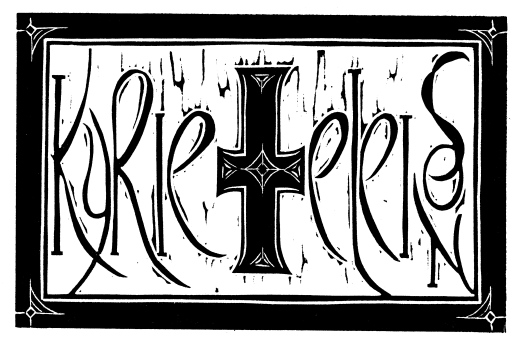Kyrie Eleison, Lord Have Mercy
“Kyrie eleison Christe elesion” — “Lord have mercy, Christ, have mercy” —we pray these words of petition for all creation, our world, ourselves, our community, the church worldwide, and for those who cannot or will not pray. Together we say, “So be it” (“Amen”), in agreement and thankful assurance that our help is in the name of the Lord whom this mercy comes.
It strikes me that the phrase from the Lord’s Prayer, “…and forgive us our trespasses as we forgive those who trespass against us…” could just as easily have been written, “and have mercy on us as we have mercy on others.” Certainly, mercy was a major theme in Jesus’ teachings, as was the analogous theme of forgiveness.
Think of the people who approached Jesus with this simple prayer, “Kyrie eleison”, “Lord, have mercy”:
- The Canaanite woman whose daughter was tormented by a devil. She persisted in her plea for mercy until her daughter was healed.
- The man whose son was possessed by an evil spirit that threw him into the fire. He came to Jesus with the plea Kyrie eleison. The prayer was answered, and his son was healed.
- The two blind men sitting by the road outside Jericho who cried out to Jesus, Kyrie eleison. That cry was heard by Jesus who healed both of them.
- A final example. Jesus is left alone with the adulteress. Misery is left alone face to face with mercy. And she hears from the mouth of Jesus the words, “Neither do I condemn thee. Go and sin no more.” That is God’s mercy!
Matthew is a prime example. A tax collector and hated by the Jews, Jesus called Matthew to be one of his apostles. In the gospel of Matthew, the writer seems to understand this. His genealogy of Jesus includes four women (Tamar, Rahab, Ruth, Bathsheba), each of whom was perhaps less than upstanding in at least one serious situation. In addition, Matthew includes the story of the unmerciful servant (Matthew 18). It is as if Matthew is making the case that, along with these others, even he could be accepted by Jesus.
What about us? “Lord, have mercy on me as I have had mercy on others.” Jesus ends Matthew’s story of the unmerciful servant with these words, “This is how my heavenly Father will treat each of you unless you forgive your brother or sister from your heart” (Matthew 18:35). I know some families whose brothers will literally not speak to one another because of some problem they had decades ago.
There are countries that continue to hate their neighboring countries because of what they did years or even centuries ago. And there are politics that pit one faction against the other, even to the point of discussing civil war. I cannot but wonder where this key teaching of Jesus, “Lord, have mercy”, fits into our world and theology today.
Might we decide to use the theme of “Mercy!” as our phrase to meditate on in the coming year? The world certainly needs it. We are certainly damaged when we do not give it. How would Jesus want you to respond to the Matthews in your life today?
Blessings and peace,
Chaplain Kenny


No comments:
Post a Comment